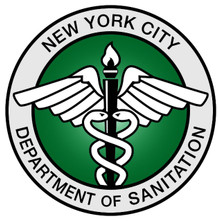New York City is a bustling metropolis with over 8.3 million residents, generating an enormous amount of trash each day. In order to maintain a clean and healthy living environment, the Department of Sanitation (DSNY) has established strict requirements for outdoor trash storage that include using regulation-compliant trash enclosures such as BrownstoneBin, the rat-proof trash can storage solution.
Here's a closer look at the DSNY requirements for outdoor trash storage in New York City:
- Containers The DSNY requires all outdoor trash to be stored in containers that are leak-proof, rust-resistant, and have tight-fitting lids. These containers should be made of durable materials, such as metal or heavy-duty plastic, and should be able to withstand harsh weather conditions. The containers must also be rodent-proof, to prevent infestations.
- Size and Capacity Trash containers must be of sufficient size and capacity to accommodate the amount of waste generated by the property. For residential properties, this means that the container must be large enough to hold at least one week's worth of waste. For commercial properties, the container size and capacity will depend on the volume and type of waste generated. The DSNY also requires that the containers be kept at a distance of at least 10 feet from any building or structure.
- Location Trash containers must be stored in a location that is easily accessible to DSNY collection trucks. They should not be obstructed by parked vehicles, trees, or other objects that may impede collection. In addition, the containers must be placed on a stable surface, such as a concrete pad, and must not block sidewalks or pedestrian walkways.
- Collection Schedule The DSNY has established a collection schedule for residential and commercial properties. Residential trash is collected once or twice a week, depending on the location, while commercial properties may have daily or multiple pickups per week. Property owners are required to comply with the collection schedule and have their trash containers placed outside for collection on the designated days.
- Bagging Requirements Trash bags should be sturdy and leak-proof, and should be placed inside the containers. The DSNY requires all trash to be bagged, to prevent littering and to keep the containers clean. The bags should be tied securely and placed inside the containers with the lids tightly closed.
- Recycling Requirements New York City has a mandatory recycling program for certain materials, such as paper, cardboard, glass, metal, and plastic. Property owners are required to separate these materials from regular trash and place them in designated recycling containers. The DSNY provides free recycling containers to residential properties, and commercial properties are required to provide their own recycling containers. Failure to comply with the recycling program may result in fines and penalties.
- Illegal Dumping The DSNY takes illegal dumping very seriously and has established strict penalties for violators. Illegal dumping includes any disposal of trash or debris in public areas, such as streets, sidewalks, or vacant lots. Property owners who are found to be illegally dumping may face fines, penalties, and even legal action.
The DSNY requirements for outdoor trash storage are essential for maintaining a clean and healthy living environment. Property owners and managers should be aware of these regulations and ensure that their trash containers are in compliance. Property owners may want to consider working with a professional NYC property-compliance service. Failure to comply with DSNY regulations may result in fines, penalties, and legal action. By working together, we can keep New York City clean and safe for all residents and visitors.

